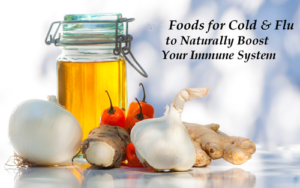Winter brings cozy sweaters, festive cheer, and unfortunately, the dreaded cold and flu season. A runny nose, scratchy throat, and fatigue can quickly turn a magical winter wonderland into a sniffly nightmare. While there’s no miracle cure, what you eat can play a significant role in bolstering your immune system and helping your body fight off these unwelcome visitors.
Let’s ditch the chicken soup myths (although a warm bowl can be comforting!), and dive into the latest science-backed insights on how specific foods can become powerful allies in your fight against cold and flu.
Packing a Punch with Powerful Antioxidants
Imagine your immune system as a well-trained army. To function at its best, it needs the right ammunition. This is where antioxidants come in. These superhero molecules fight free radicals, unstable compounds that damage cells and weaken your defenses.
Here are some food superstars rich in antioxidants that can give your immune system a fighting chance:
- Citrus Fruits: They’re a classic for a reason! Grapefruits, oranges, lemons, and limes are all packed with vitamin C, a well-known antioxidant that increases the production of white blood cells, which are essential for fighting infection. While the debate on whether high doses of vitamin C directly shorten the duration of a cold is ongoing, studies show it can help reduce the severity of symptoms.
- Bell Peppers: Don’t underestimate the humble bell pepper! Both red and green varieties are excellent sources of vitamin C and also contain powerful antioxidants called flavonoids, which have anti-inflammatory properties.
- Berries: These little gems come in a burst of flavors and are loaded with antioxidants called anthocyanins. Studies suggest that anthocyanins may help shorten the duration of a cold and reduce inflammation. So, stock up on blueberries, raspberries, strawberries, and tart cherries!
- Broccoli: This cruciferous vegetable is a nutrient powerhouse. It’s rich in vitamin C, vitamin A, and fiber, all of which contribute to a healthy immune system.
- Leafy Greens: Popeye was onto something! Spinach, kale, and other dark leafy greens are packed with vitamins A and C, as well as folate, which is essential for proper immune function.

Beyond Vitamin C: Other Essential Nutrients for Immune Support
While vitamin C gets a lot of attention, a well-functioning immune system relies on a variety of nutrients. Here are some other key players to consider:
- Vitamin D: Often referred to as the “sunshine vitamin,” vitamin D plays a crucial role in regulating the immune system. Studies suggest that sufficient vitamin D levels may help reduce the risk of respiratory infections, including the flu. Fatty fish, egg yolks, and fortified foods like milk and cereals are all good sources of vitamin D.
- Zinc: This mineral is essential for the development and function of immune cells [9]. Oysters are a champion source of zinc, but meat, poultry, beans, and nuts are also good options.
- Elderberry: This dark-colored berry has been used for centuries in traditional medicine to boost the immune system. While more research is needed, some studies suggest that elderberry extract may help reduce the duration and severity of flu symptoms.
Functional Foods and Flu Fighters:
- Garlic: This pungent herb has been shown to have antimicrobial and immune-boosting properties. While the jury’s still out on how effective garlic is at preventing the common cold, studies suggest it may help reduce the severity of symptoms.
- Ginger: This versatile spice is a natural anti-inflammatory and can help soothe a sore throat and ease nausea, common cold and flu symptoms.
- Green Tea: This warming beverage is rich in flavonoids, which have antioxidant and anti-inflammatory effects. While green tea may not prevent you from getting sick, it can help manage symptoms and promote overall well-being.
Keeping Hydrated: Don’t Underestimate the Power of Water
Remember, even superheroes need to stay hydrated! Drinking plenty of fluids helps thin mucus, loosen congestion, and flush toxins from your body. Water is always the best choice, but herbal teas can also be keeping hydrated.
Beyond Food: Lifestyle Habits for a Stronger Defense
While focusing on a nutritious diet is essential, a holistic approach is key for keeping cold and flu at bay. Here are some supportive lifestyle habits:
- Get Enough Sleep: During sleep, your body produces cytokines, proteins that help fight infection. Aim for 7-8 hours of quality sleep each night.
- Manage Stress: Chronic stress can weaken your immune system. Practice relaxation techniques like yoga, meditation, or deep breathing to manage stress levels.
- Wash Your Hands Frequently: This simple act is one of the most effective ways to prevent the spread of germs. Wash your hands with soap and water for at least 20 seconds, especially after being in public places.
- Don’t Neglect Exercise: Regular physical activity can boost your immune system and improve overall health. Aim for at least 150 minutes of moderate-intensity exercise or 75 minutes of vigorous-intensity exercise each week.
Remember, While these nutritional strategies can be powerful allies, prevention is always better than cure. The best defense against cold and flu is getting vaccinated each year. The Centers for Disease Control and Prevention (CDC) recommends annual flu vaccination for everyone 6 months of age and older.
Wrapping Up
So, the next time you’re facing down a cold or flu, remember, that what you eat plays a significant role in your body’s ability to fight back. Load up on nutrient-rich foods, prioritize a healthy lifestyle, and consider getting vaccinated. By taking a multi-pronged approach, you can give yourself the best chance of staying healthy throughout the winter season.
Remember, even with heightened awareness, we can still fall prey to cold and flu viruses. The key lies in fortifying our immune functions with the right foods. So choose wisely, and let your plate become your armor against the flu!
